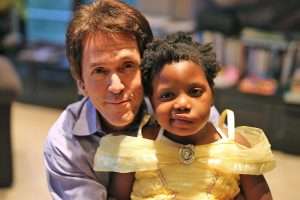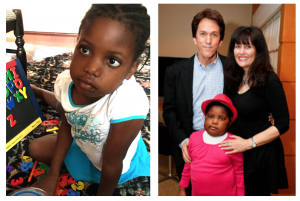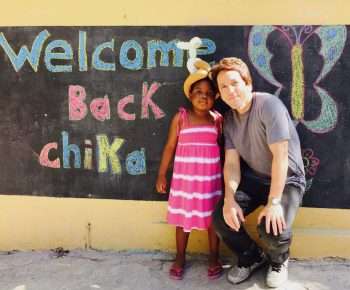January 9, 2010 – April 7, 2017
Diagnosed: May 2015
Chika was just 3 days old when a massive earthquake struck Haiti in 2010, demolishing everything around her. For months afterward, Chika and her mother slept in the sugarcane fields, forging forward in extreme poverty while Haiti desperately struggled to recover.
 Meanwhile, in Detroit, Mitch Albom and his wife, Janine, learned about an orphanage in Port-au-Prince that had reportedly been destroyed. No one could be reached, and it was feared that all of the children had been lost to the earthquake.
Meanwhile, in Detroit, Mitch Albom and his wife, Janine, learned about an orphanage in Port-au-Prince that had reportedly been destroyed. No one could be reached, and it was feared that all of the children had been lost to the earthquake.
“Something about not knowing the fate of children seemed terrifying,” said Mitch, who felt a pull to do anything he could to help. After many hurdles, he was able to charter a small plane into Haiti just weeks after the earthquake, before any commercial travel had reopened.
Once there, Mitch learned that the orphanage had been spared. Still, the children were living in extreme poverty. Despite that, their joy and hope made an indelible impression. Upon returning to Michigan, he couldn’t stop thinking about them. He and Janine began returning to Haiti every month, helping to make improvements to the orphanage, and bringing along a crew of Detroit-based construction experts, who built the first showers, toilets, kitchen, dining room, and schoolhouse the orphanage had ever had. After a few months, Mitch offered to take over the orphanage. He renamed it the Have Faith Haiti Mission, and he’s been running it ever since.
Chika was brought there when she was 3 years old, after her mother passed away during childbirth of a baby brother. The resilience young Chika had needed in her short life so far was evident in everything she did. She was brave, self-assured, and funny, and made a quick impression on everyone at the orphanage.
 Even though she was the youngest of the 40-plus children who lived there, “She was a bossy ball of fire who was soon directing the other kids like a drill sergeant, ”Mitch wrote in his book Finding Chika: A Little Girl, an Earthquake, and the Making of a Family”.
Even though she was the youngest of the 40-plus children who lived there, “She was a bossy ball of fire who was soon directing the other kids like a drill sergeant, ”Mitch wrote in his book Finding Chika: A Little Girl, an Earthquake, and the Making of a Family”.
Then, at age 5, tragedy struck again: Chika was diagnosed with a brain tumor. Mitch and Janine knew Chika’s only hope was to receive treatment in the United States. They brought her from Haiti to C.S. Mott Children’s Hospital in Ann Arbor, hoping that she could be cured. That was where Mitch and Janine learned the devastating reality: Chika had DIPG. The survival rate is basically zero.
Doctors estimated Chika had four months to live. They gently suggested Mitch and Janine take her back to Haiti to live out her remaining days. But the couple refused. “She’s a fighter,” Mitch said. “And if she fights, we’re gonna fight.” That began a nearly two-year journey that would span this country and others, as Janine, Mitch, and Chika became an unlikely family united by a single desire: to keep Chika alive.
 Early on, Mitch and Janine learned that Chad Carr was also battling the same disease. “When Tammi first heard about my little girl’s diagnosis, she cried over the phone,” said Mitch in a piece he wrote for the Detroit Free Press. “There is something that hits you when your own child is suffering that makes the suffering of every child in the world seem personal.” Mitch and Tammi compared notes throughout their kids’ battles. Chika and Chad even saw the same doctors, underwent some of the same procedures, and both participated in an early study conducted out of Memorial Sloan Kettering Cancer Center in New York City.
Early on, Mitch and Janine learned that Chad Carr was also battling the same disease. “When Tammi first heard about my little girl’s diagnosis, she cried over the phone,” said Mitch in a piece he wrote for the Detroit Free Press. “There is something that hits you when your own child is suffering that makes the suffering of every child in the world seem personal.” Mitch and Tammi compared notes throughout their kids’ battles. Chika and Chad even saw the same doctors, underwent some of the same procedures, and both participated in an early study conducted out of Memorial Sloan Kettering Cancer Center in New York City.
Chad lost his fight to DIPG in November of 2015, five months into what would become Chika’s 23-month battle with the disease. Chika died on April 7, 2017. Two children were lost, gone so quickly from this world, but each would leave a legacy that inspired so many others, and forged a unique bond between the parents.
The ChadTough Foundation is honored to have Team Chika and the Albom family as an official Family Partner. Together, these families are dedicated to changing the outcome for future families who are faced with a DIPG diagnosis. By helping to fund innovative, collaborative pediatric brain cancer research, these families firmly believe that one day DIPG will no longer be a death sentence.


